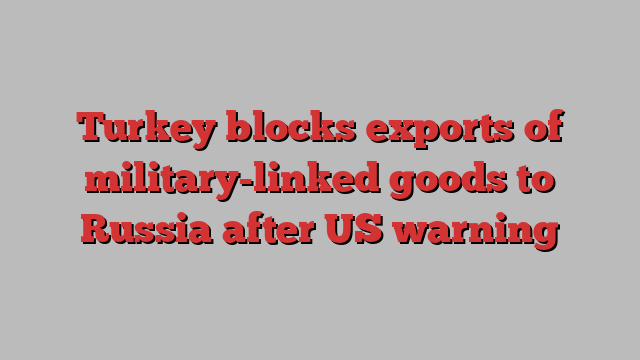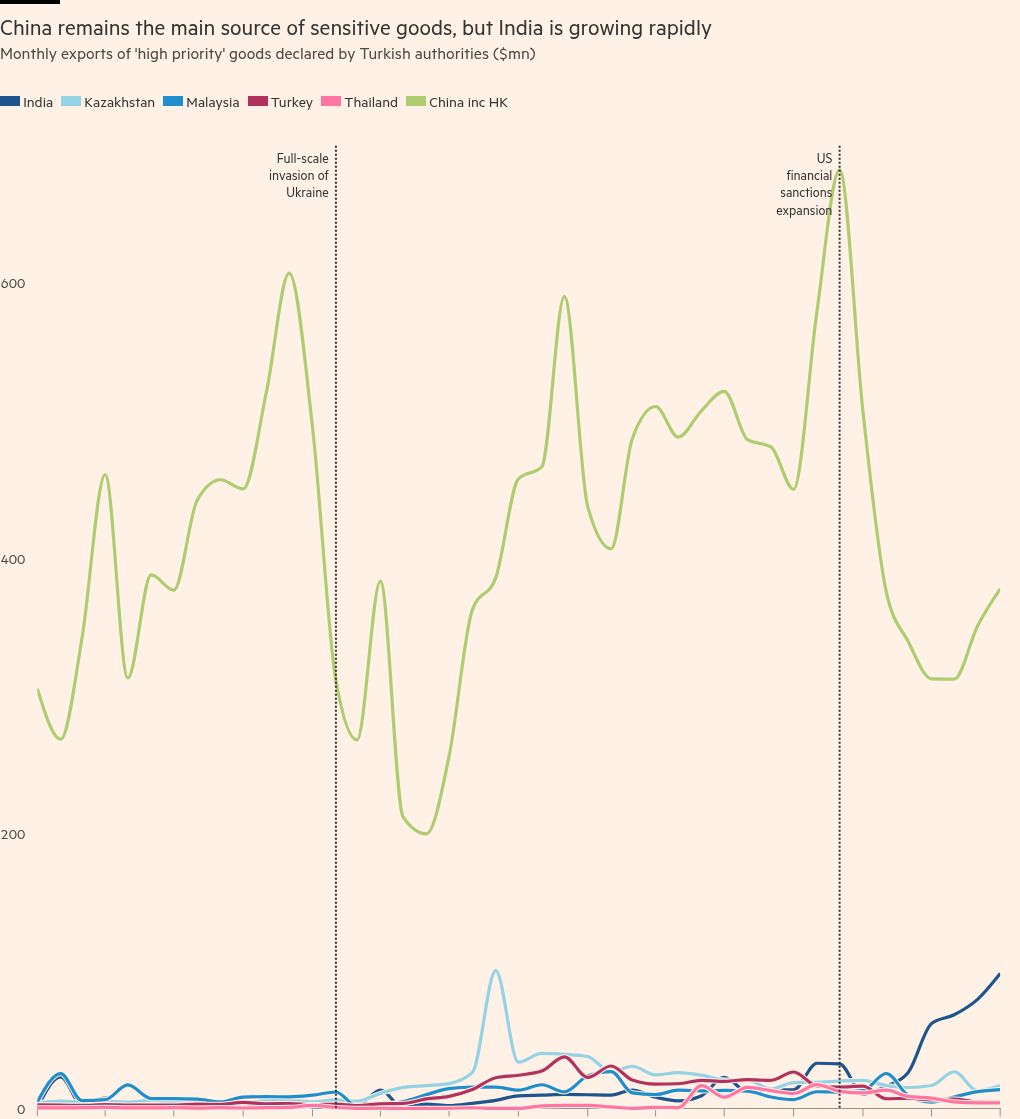
Unlock the US Election Countdown newsletter for free
The stories that matter on money and politics in the race for the White House
Turkey has secretly barred exports to Russia of US military-linked hardware after Washington warned Ankara of “consequences” if it did not halt the trade.
Ankara has in recent weeks adjusted its customs systems to block exports of more than four dozen categories of US-origin goods that Washington and its western allies view as vital to Moscow’s war effort in Ukraine, according to three people with direct knowledge of the matter.
Turkey’s electronic customs system no longer allows exporters to proceed with sending shipments of the so-called “battlefield goods” to Russia, one of the people said, having previously enabled them to be transported there. Similar goods originating from the EU were blocked earlier and remain so, two of the people said.
The trade curbs, which affect civilian parts such as microchips and remote control systems that western allies say are being used in weaponry, were not publicly announced because of “political sensitivities”, one of the people said.
Turkey’s trade ministry and Dmitry Peskov, spokesperson for Russian President Vladimir Putin, did not respond to requests for comment.
Turkish President Recep Tayyip Erdoğan has positioned himself as a potential peacemaker in the Ukraine war while retaining warm relations with Putin. The two men are due to meet at this week’s Brics summit in Kazan on Wednesday.
The quiet bans on military-linked exports to Russia, however, are the latest sign that Turkey is stepping back from the role as a lifeline from western sanctions that it embraced earlier in the war.
Turkish banks sharply cut back their business with Russian counterparties this year after the US issued an executive order threatening sanctions against lenders processing transactions for the Kremlin’s war machine.
Turkey’s trade curbs come as the US is seeking to staunch Russia’s access to western technology that is being used in Moscow’s military systems more than two years after Putin launched a full-scale invasion of Ukraine.
The banned goods are taken from a list of 50 “high-priority” western-made items that the US, UK, EU and Japan have identified as crucial to Russia’s imports for its arms industry.
They include advanced electronics that regularly turn up in missiles and drones downed in Ukraine, such as processors and memory cards, as well as machine tools and other equipment used to produce weapons.
Washington has long harboured concerns that Turkey is being used as an intermediary through which Russia is accessing military-linked goods, a suspicion that has tarnished relations between the two allies.
The Biden administration has dispatched top officials to Turkey in a bid to press Erdoğan’s government to take action, while also hitting Turkish companies with sanctions for taking part in the trade with Russia.
Turkish exports of these goods surged in the aftermath of the full-scale invasion, increasing from about $3mn a month at the start of the war to a peak of about $38mn in December 2022, according to official Turkish government statistics. They registered about $4.1mn in August this year, the most recent figures available.
The more recent fall in direct trade is thought to be partly attributable to a shift in some battlefield goods being exported from Turkey to intermediaries such as Kazakhstan and Azerbaijan, before ultimately reaching Russia. The new Turkish trade curbs do not affect exports to these countries.
Matthew Axelrod, the assistant commerce secretary leading US efforts to keep sensitive technology out of the hands of America’s adversaries, in August met Turkish officials and executives in Ankara and Istanbul. At that time, he warned that Turkey would face “consequences” if it did not take steps to stop dealings with Russia in battlefield goods.
Axelrod is a senior official at the Bureau of Industry and Security, which has broad powers to apply damaging export controls.
“We believe the Turkish government heard and understands our concerns. We’re optimistic we’ll see increased co-operation going forward,” Axelrod told the Financial Times in response to queries about signs that Turkey is moving away from the trade in battlefield goods.
The most significant supplier of these high-priority goods remains China, which shipped $377mn to Russia in July 2024.
India’s exports to Russia have surged to almost $100mn per month, almost entirely driven by a sudden rise in the flow of computers and computing components, including Chinese-assembled Apple computers and high-end servers intended for use in artificial intelligence-focused data centres.

